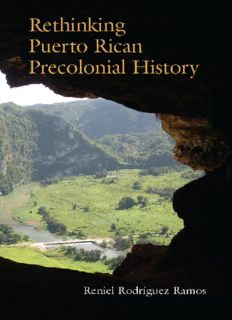
Rethinking Puerto Rican Precolonial History PDF
Preview Rethinking Puerto Rican Precolonial History
Rethinking Puerto Rican Precolonial History Caribbean arChaeology and ethnohistory l. antonio Curet, series editor Rethinking Puerto Rican Precolonial History reniel rodríguez ramos the University of alabama Press tuscaloosa Copyright © 2010 the University of alabama Press tuscaloosa, alabama 35487- 0380 all rights reserved manufactured in the United states of america typeface: minion ∞ the paper on which this book is printed meets the minimum requirements of american national standard for information sciences- Permanence of Paper for Printed library materials, ansi Z39.48- 1984. library of Congress Cataloging-in-Publication data rodriguez ramos, reniel. rethinking Puerto rican precolonial history / reniel rodriguez ramos. p. cm. — (Caribbean archaeology and ethnohistory) includes bibliographical references and index. isbn 978-0-8173-1702-7 (cloth : alk. paper) — isbn 978-0-8173-5609-5 (pbk. : alk. paper) — isbn 978-0-8173-8327-5 (electronic) 1. indians of the West indies—Puerto rico— antiquities. 2. indians of the West indies—antiquities. 3. Puerto rico—antiquities. 4. West indies—antiquities. 5. archaeology and history—Puerto rico. i. title. f1969.r65 2010 972.95′01—dc22 2009049568 Cover: Cueva ventana, Puerto rico. Contents list of illustrations vii acknowledgments xi 1. introduction 1 2. Culture history: toward a revamped Perspective 12 3. the method, the sample, the Contexts 27 4. discovery of Puerto rico and the lifeways of its earliest inhabitants 50 5. Coming, going, and interacting: an alternative Perspective on the “la hueca Problem” 88 6. horizontal diversification in Puerto rico: the forging of new identities 145 7. the intensification of regional Political integration 187 8. Putting it all together 210 references Cited 223 index 265 Illustrations figUres 1.1. location of Puerto rico within the Caribbean 3 2.1. rousean chrono- cultural sequence for Puerto rico 16 3.1. general core- flake reduction model 38 3.2. Plot of 2σ ranges of calibrated radiocarbon dates from the sites included in this study 44 3.3. location of selected sites from which lithic collections were analyzed in the present work 45 4.1. Plot of 2σ ranges of calibrated radiocarbon dates from Pre- arawak contexts in Puerto rico 55 4.2. Cores and flakes made by the cobble- slicing technique 59 4.3. Chert parallel flakes 60 4.4. other core- flake reduction formats and types of retouched flakes 61 4.5. ground tools from Pre- arawak contexts 63 4.6. Personal adornments and other sumptuary materials from Pre- arawak contexts in Puerto rico 66 4.7. sumptuary materials from Pre- arawak contexts 67 4.8. Use- modified materials 70 4.9. Pre- arawak pottery from lithostratigraphic unit b of the Paso del indio site 74 viii / Illustrations 5.1. Calibrated 2σ ranges of radiocarbon dates from the lh and the hacienda grande components of la hueca- sorcé 97 5.2. avian pendants from the lh component of la hueca- sorcé 103 5.3. Plano- convex adzes from Cedrosan contexts 106 5.4. lh core- flake freehand reduction formats at la hueca- sorcé and Punta Candelero 111 5.5. lh bipolar cores and flakes from la hueca- sorcé and Punta Candelero 113 5.6. types of flake retouch 115 5.7. lh celts 117 5.8. lh adze types 119 5.9. other ground materials 121 5.10. Comparison of termination techniques between lh and Cedrosan ground tools 130 5.11. Comparison of motifs between the lh component of la hueca- sorcé and Punta Candelero and those noted in the isthmo- Colombian area 136 5.12. Jadeite ground tools analyzed by george harlow 141 6.1. Calibrated 2σ ranges of radiocarbon dates from late Pre- arawak and early lh and hacienda grande contexts of Puerto rico 151 6.2. Calibrated 2σ ranges of radiocarbon dates associated with pottery of the Cuevas and Pure ostiones styles 157 6.3. Calibrated 2σ ranges of radiocarbon dates associated with pottery of the Cuevas, Pure ostiones, monserrate, and santa elena styles 159 6.4. location of selected sites 162 6.5. Calibrated 2σ ranges of radiocarbon dates from río tanamá, Paso del indio, Punta Candelero, and Punta guayanés 163 6.6. Comparison of proportions of imported vs. local raw materials for core- flake reduction at Punta Candelero, Punta guayanés, Paso del indio, and río tanamá 164 6.7. Cobble- slicing cores and imported flakes from río tanamá and Punta Candelero 166 6.8. Comparison of proportions of bipolar and freehand cores at Paso del indio, río tanamá, Punta guayanés, and Punta Candelero 168 6.9. ground tools from Paso del indio, río tanamá, and Praderas 173 Illustrations / ix 6.10. other ground materials from Paso del indio, Punta Candelero, and río tanamá 176 7.1. Calibrated 2σ ranges of radiocarbon dates associated with Capá and esperanza pottery 191 7.2. imported chert parallel flakes from finca de doña rosa and Cueva de los muertos 192 7.3. sumptuary materials from Paso del indio and río tanamá 193 7.4. Jadeite celts from Puerto rico 205 7.5. artifacts made of guanín from Chorro de maíta, Cuba 207 8.1. high- low logs showing the temporal distribution of the different pottery styles defined for Puerto rico 212 8.2. squatted pendant on display at the museo del Jade, Costa rica 221 tables 3.1. general categories of analyzed materials by site 46 5.1. distribution of lithic artifacts by general category in the lh component at la hueca- sorcé and Punta Candelero 108 5.2. distribution of general raw materials used for core- flake reduction in the lh component at la hueca- sorcé and Punta Candelero 109 5.3. Cortex content percentages for flakes and shatter in the lh component at la hueca- sorcé and Punta Candelero 110 5.4. Core types in the lh component at la hueca- sorcé and Punta Candelero 112
Description: